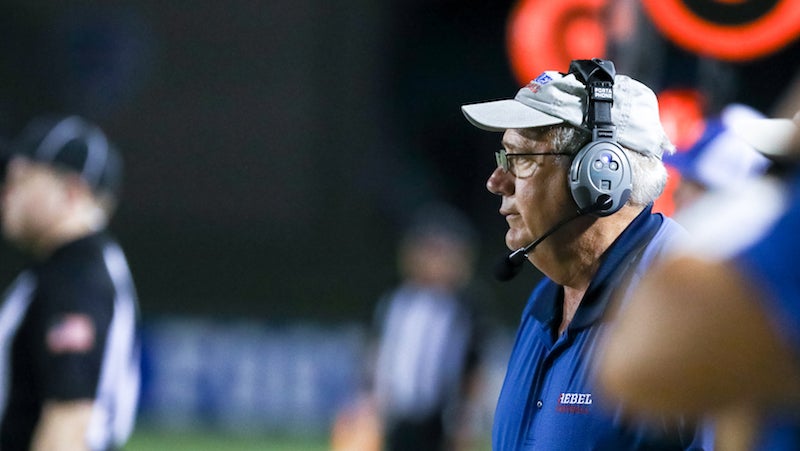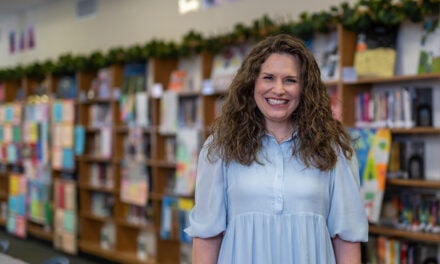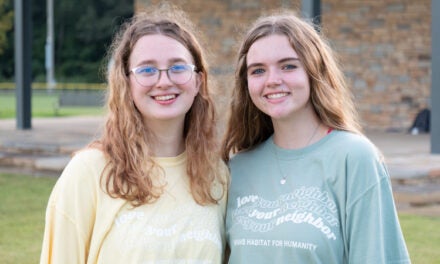By Mary Alayne B. Long
In January of 1972, three Vestavia Hills High School coaches decided to head off campus for a quick lunch. Sadly, it would be their last. As a truck traveling down Highway 31 lost its brakes and barreled through an intersection, those three lives were cut short in a tragic event that still shakes the entire community when it is mentioned.
While the school was distraught, they had to carry on. One of the first things they did in their efforts to move forward was to hire Buddy Anderson as their head football coach. Coach Anderson had been taken on as a student teacher in December of 1971, and this was most certainly not the way he wanted to receive a promotion. Although he was still young, he was already a strong leader to step in as students and athletes struggled through the crisis though. Fast forward to 2020: Coach Anderson has been still setting a solid example and leading young men to victory on and off the field for nearly 50 years. Now he has plans to retire from coaching after this fall’s football season.
That young newlywed who brought his bride to Vestavia Hills all those years ago has since raised three daughters, all graduates of VHHS, and is now grandfather to seven. He is quick to tell anyone who will listen that he was called by God to coach football on January 12, 1968. His father coached high school ball for 31 years, and it was not difficult to make the decision to follow in his footsteps. He studied both physical education and math at Samford University, and while he spent many years in the classroom, his heart has always been on the football field. That’s where he bonds with the players and really connects with them.
In the spring of 1973, Coach Anderson and his wife, Linda, made their first trip to a National Fellowship of Christian Athletes (FCA) conference. It wasn’t something they had planned to do, and they weren’t really sure how they would find a way to attend. At the last minute, things worked out, and that trip that would lay the foundation for years of service through FCA.
It’s also the place where Linda says she first felt God speak to her about football. “I know God called you to coach football, and this week he called me to be a coach’s wife,” she told her husband. Through the years Linda has been a school teacher, a stay-at-home mother, a private tutor and worked for Alabama Public Television as well as in the ministry field. All that while being a loving coach’s wife—which is a job in itself—and she does it all with a big smile on her face.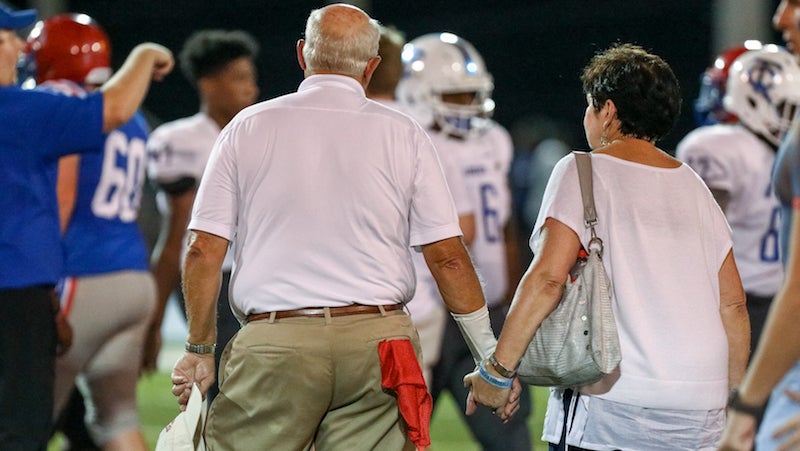
That first trip to FCA camp started a yearly tradition that lasted over 40 years until the camps ended. Coach Anderson says that those FCA camps helped to keep their marriage strong for decades, and it’s also where he got the idea to start an FCA group in his home. Since the early ‘70s, on Wednesday nights his house has been full of athletes who want to learn more about God. As we were writing this article, he was working on a socially distanced version, and there’s no doubt he will find a way to keep the tradition alive.
Today eight coaches at VHHS are Anderson’s former players too. One of them, Jeff Segars, took over as the school’s athletic director in 2015 from Anderson, who started in the role in 1981. When I asked Jeff to share a lesson he learned from him as a player, he said: “Tough times don’t last. Tough people do. The lessons you learn in athletics last longer than the actual event itself.” Now as a coach, his biggest lesson from Anderson is: “The student is more important than the athlete. Continuing their education through athletics is a priority.”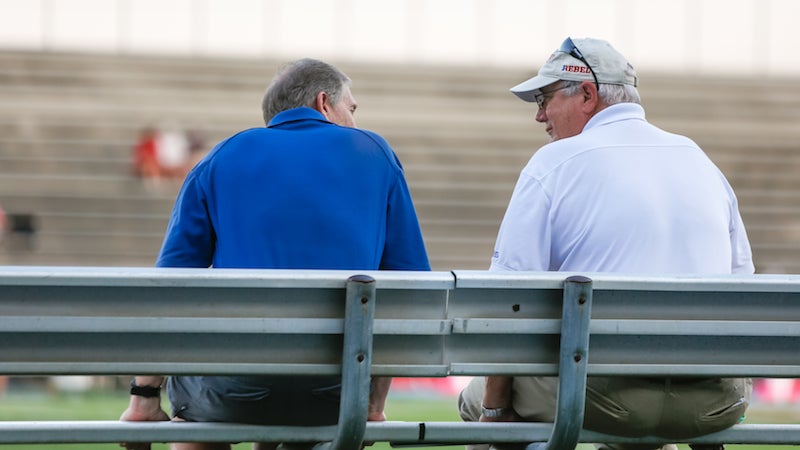
While his focus was always on the students, Coach Anderson saw many wins in his tenure too. In fact, he has the most wins of any high school football coach in the entire state of Alabama, and his 342-153 record speaks for itself. He and his father are also one of only two father-son pairs to be inducted into the Alabama High School Hall of Fame. And countless former players went on to be successful in college athletics. Some went on to the NFL, and former player David Jordan was a member of the 1986 Super Bowl winning New York Giants team.
Beyond his players, Coach Anderson has had a strong and positive influence on other coaches through the years. Ryan Herring, head coach in Pierce County, Georgia, is another second-generation football coach whose dad became friends with Coach Anderson back in the early 1970s when they were both coaching in Birmingham. “They were alike in so many ways: both strong Christian men, both strong citizens in their communities and both coached over 40 years,” Ryan shares. “My dad was always my coaching mentor in life, and around 2007 I gained Buddy Anderson as another mentor. I called him a lot and visited him several times picking his brain for football advice. He never once put me off or was too busy to help a young coach. When my dad passed away, he was one of the first to call, and we talked for over an hour. He is definitely in a league of his own. I love Buddy Anderson. He is a real man.”
Coach Anderson’s impact reaches far and wide throughout the community and across all sorts of professions. Everyone knows he’s an unbelievable coach, 1982 VHHS graduate Mitch Allen, will tell you. “I was fortunate to be a part of one of his state championship teams,” Mitch says. “But to me and the thousands of young men that got to play for him during his career, his biggest value was in the impact he had in our lives as husbands, fathers, Christian leaders, friends and really, just as people living in our communities. Everyone who knows Coach Anderson knows that this is why he did it, and what he cared about most—positively impacting the lives of everyone around him. He sure had a big impact on me and my life, and I am grateful for him.”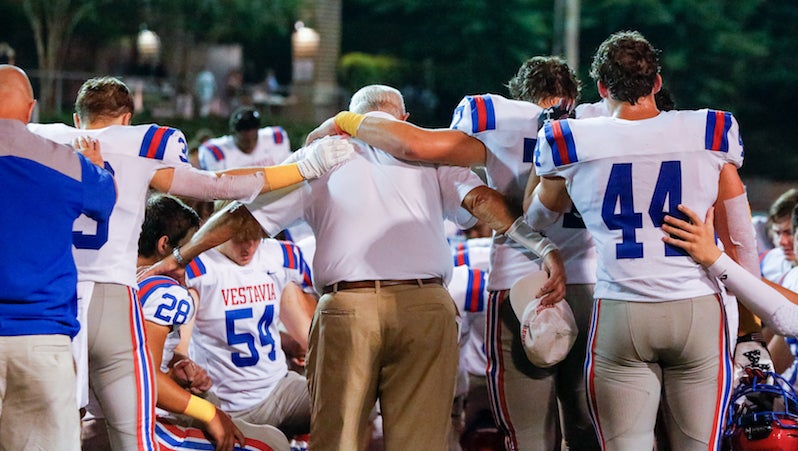
2010 graduate Austin Whitt speaks to a similar influence on his life. “Coach Anderson was such a great high school coach not only because of his coaching ability but because he cared more about the men he was ‘raising’ by coaching them,” he says. “At a time when you’re figuring out who and what you are as a boy, and in a sport that takes so much time, effort, sweat and constructive criticism, it was so beneficial to have a coach who understood his players. In any given day we were arguably with our coaches more than our parents, so it’s really important to have a coach you can see as a father figure.”
My own son played for Coach Anderson and never missed a single one of those FCA meetings. I asked him to share a great lesson he’d learned from Coach that he carries with him still today. “Life is like football,” he told me. “It’s a game that teaches you lessons you can’t learn in a book. When you get knocked down, you get back up. When you get your nose bloodied, you get back up. When the breaks of the game go against us, we don’t let up, we go harder.”
Finally, I asked Coach Anderson what led him to choose 2020 as his last to coach high school ball. He shared that when he finally decided to retire, he prayed about it a lot. A whole lot. “I probably would have closed it out last year, but it didn’t feel right with the way school ended,” he says. “Enough had happened already, and I didn’t want to add to everything by leaving my players. This year felt right. And I know God still has a plan for me, I just don’t know what all it will be yet.”
I don’t know what that plan is either, but I know it is a great one. And I know that Buddy Anderson will carry on making a difference in the lives of young people.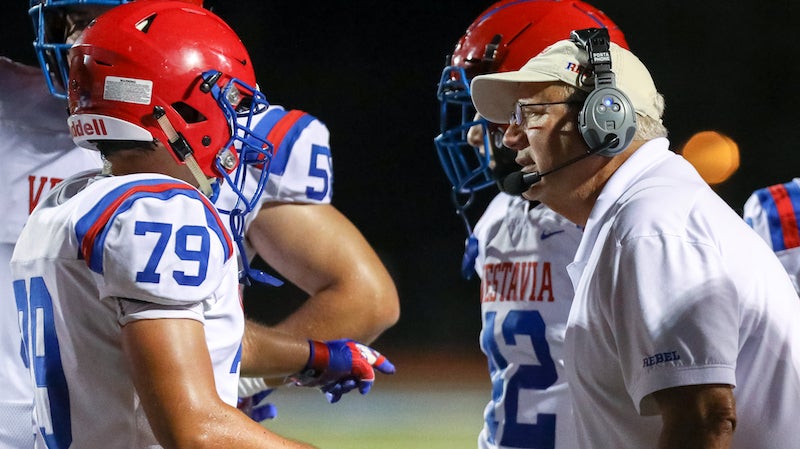
A Chat with the Coach
I have been fortunate to know Coach Anderson for years, and when we talked about this story, I couldn’t pass up the chance to ask a few questions of my own.
What would you say to someone who is going into coaching now?
Coaching is a commitment to working with kids. It’s not just a job. Mine was a calling, and maybe somebody else is going into it for other reasons. But you’ve got to care about the kids.
What is one great lesson you’ve learned as a coach?
In the total scheme of things, relationships matter most. I’m competitive and I like to win, but relationships that last a lifetime, and for eternity. That’s what really matters.
What’s one good thing about high school athletics in 2020?
A lot of things are still the same and haven’t changed. Kids want to belong to something bigger than their self. They are looking for a group.
What’s one bad thing about high school athletics in 2020?
We’ve become such an instant society. With technology our kids are exposed to so much. There are so many predators out there and it’s scary to me. Also, parents don’t need to make it all better all the time. Kids need to stand on their own two feet and learn how to be productive for themselves.

